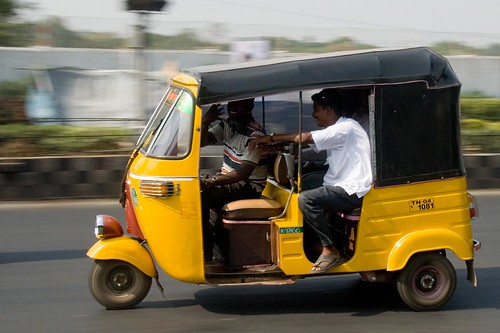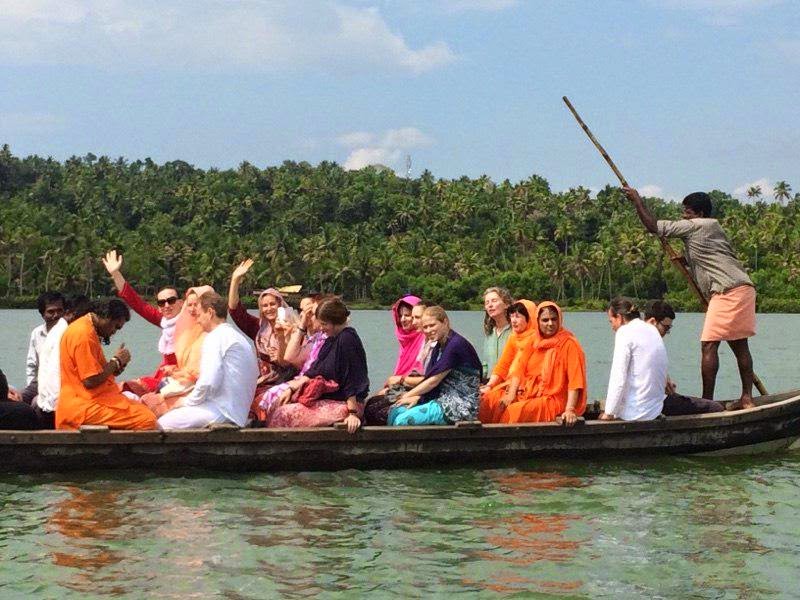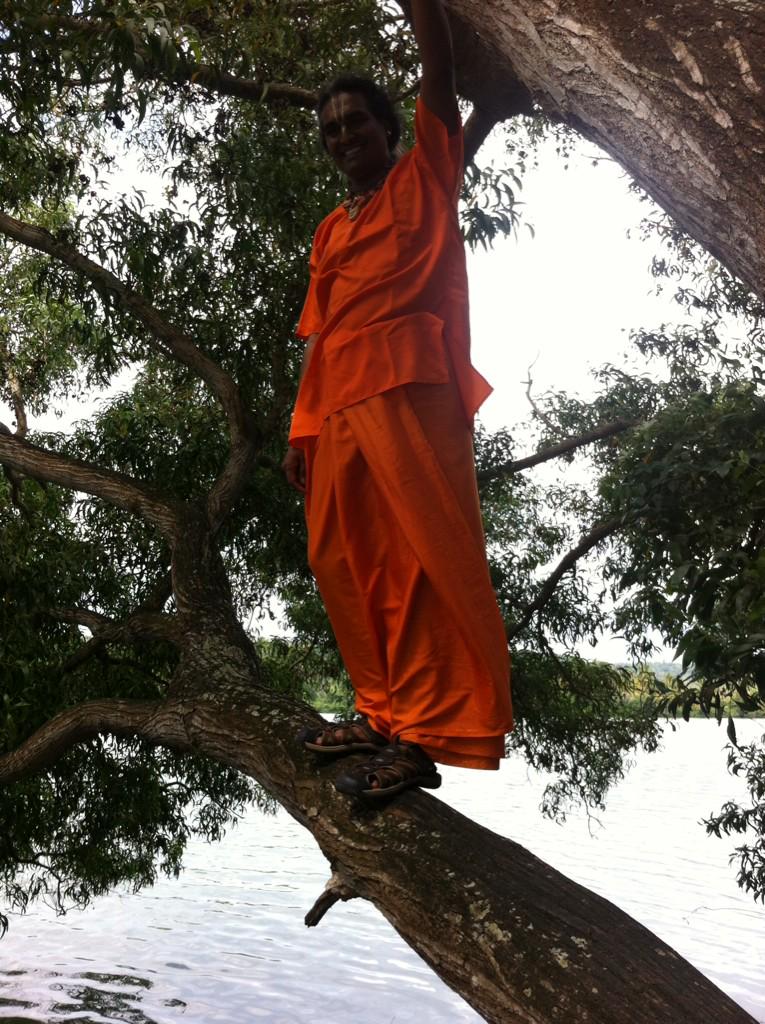Once upon a time, on a journey away from the hustle and bustle of daily Indian life, away from the clamour and musky smell of burning coal that reaches out of a tiny one bed, kitchen and living room dwelling - we were transported away.
Our chariots were the "Tuk Tuks" - small motorbikes with a back seated area for two people. We seated three people which was below the unofficial Indian option of five ( two seats are for hanging off each side).
These bikes and their drivers dare to be reincarnated as cars, so they whizz and hoot as best they can and around as many hairpin bends as possible.
Out of the town we went, we drove through the roads as if we were in a jungle. We passed alongside a river where people on one side of the road had scraped out of existence, while on the other side of the road were spacious suburban homes with their elegant Indian styles.
Our disembarking point was created by someone who had blocked the road with a pile of sand; our vehicles could go no further. You've got to love India! A short walk transported us to where the small wooden boats awaited to take us over the lake to the Golden Island. Around us was pure greenery, like a Thailand island or some serene mangrove forest setting. Nature can bring an instant peace that is sublime in its serenity.
These bikes and their drivers dare to be reincarnated as cars, so they whizz and hoot as best they can and around as many hairpin bends as possible.
Out of the town we went, we drove through the roads as if we were in a jungle. We passed alongside a river where people on one side of the road had scraped out of existence, while on the other side of the road were spacious suburban homes with their elegant Indian styles.
Our disembarking point was created by someone who had blocked the road with a pile of sand; our vehicles could go no further. You've got to love India! A short walk transported us to where the small wooden boats awaited to take us over the lake to the Golden Island. Around us was pure greenery, like a Thailand island or some serene mangrove forest setting. Nature can bring an instant peace that is sublime in its serenity.
The usual drama of, "Do we wait for Swami? Or is it better he waits for us?" ensued for a while. It had its entertainment, as it created the atmosphere but the better option, which takes some discipline, is to withdraw into the mood of the tranquil surroundings. We needed three boats with a standing oarsmen to take us the 100 meters to the small island.
The island would take about thirty minutes to walk around, it's very flat and wondrously green. In the middle lives the temple. The journey across was like a purification process so that the mind could arrive in a clearer frame and could let the heart emerge.
I think we all had the feeling that this was truly a temple for God. Its holiness and austerity was secured by the island itself. The temple was a place of dedication, a place for people to come quietly. A temple that you could honor, rather than to ask. It was a place to pray, rather than to plead, it was a place to love, rather than to beg.
The low-level wall around it was a 50 x 50 meters square-shaped grounds, and had only three small separate standing temples that would fit only two people. The prayers are offered outside the abodes.
Swami explained how in Kerala, even the Shiva temples have a smaller temple for Vishnu. The sand around the temple was soft. Each of the temple entrances had doorkeepers of aged dark rock Shiva statues with a torch holder on the side.
After the ceremonial prayers and walking around, Swami gave a discourse. We all sat around where the yagna fire had been. It was one of those poetic moments in life, where tears of joy can just take over. It's moments like these that bring ageless love and devotion.
Swami spoke about the historical split in regards to the concept of God being both with form and formless as represented by Vaishnavas, but only as formless by the Saivites. Along with this division between beliefs, the desecration of various temples occurred in the twelfth century and political and economic aspects related there to.
Swami also went on to say that Brahma would wait until all beings become Realised before ending the world. He then paused to consider the impact of the manifestation and self-destruction that this would mean.
On the subject of enlightenment, he asked us to consider what we even understand by this relative to any expectation of such experience. He also gave time for questions. I always think I should have a book of questions ready!
One of the Russian ladies asked about the guilt she felt from her Christian Orthodox path, which made sense as to why she loved the Hindu deities so much. Swami talked with her for a long time to help her understand this better, such was her sincerity and the depth of the moment.
This may have been the longest time I have spent on such a discussion that included all the myriad aspects of culture, upbringing, and religious differences. Swami commented to someone that the questions can be everlasting, I felt like asking one more just to keep him talking due to the beauty of the temple and discourse.
It was time to leave. We crossed back over the river, and one of the boats was full of people who sang joyfully with devotion. It felt as if the trip back across the water with Swami had drifted us back to the daily world.
Swami explained how in Kerala, even the Shiva temples have a smaller temple for Vishnu. The sand around the temple was soft. Each of the temple entrances had doorkeepers of aged dark rock Shiva statues with a torch holder on the side.
Today visited the shiva temple on the island of Ponnthuruth amazing place pic.twitter.com/tr99jr1oop— Swami Vishwananda (@vishwananda) December 12, 2014
The temple felt as much Indian as it did Egyptian or as it did Greek. A temple of all ages and times. A temple for the Gods, one in honour and praise but also for in its simplicity and size, a genuine humbleness .After the ceremonial prayers and walking around, Swami gave a discourse. We all sat around where the yagna fire had been. It was one of those poetic moments in life, where tears of joy can just take over. It's moments like these that bring ageless love and devotion.
Swami spoke about the historical split in regards to the concept of God being both with form and formless as represented by Vaishnavas, but only as formless by the Saivites. Along with this division between beliefs, the desecration of various temples occurred in the twelfth century and political and economic aspects related there to.
Swami also went on to say that Brahma would wait until all beings become Realised before ending the world. He then paused to consider the impact of the manifestation and self-destruction that this would mean.
On the subject of enlightenment, he asked us to consider what we even understand by this relative to any expectation of such experience. He also gave time for questions. I always think I should have a book of questions ready!
One of the Russian ladies asked about the guilt she felt from her Christian Orthodox path, which made sense as to why she loved the Hindu deities so much. Swami talked with her for a long time to help her understand this better, such was her sincerity and the depth of the moment.
This may have been the longest time I have spent on such a discussion that included all the myriad aspects of culture, upbringing, and religious differences. Swami commented to someone that the questions can be everlasting, I felt like asking one more just to keep him talking due to the beauty of the temple and discourse.
It was time to leave. We crossed back over the river, and one of the boats was full of people who sang joyfully with devotion. It felt as if the trip back across the water with Swami had drifted us back to the daily world.


















